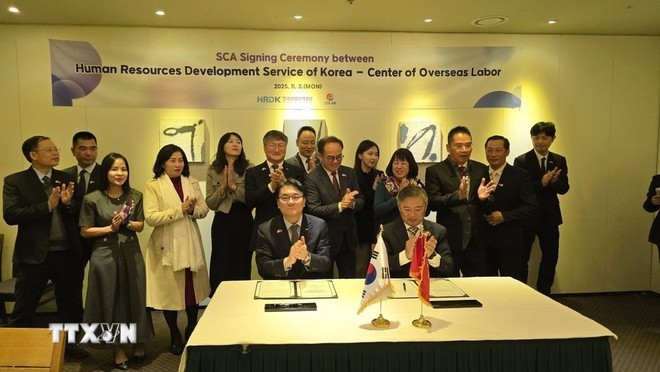The aforementioned are key areas underpinning the Employment Permit System (EPS) between the two countries.
    |
 |
|
Deputy Minister of Home Affairs Vu Chien Thang witnesses the signing of a service contract agreement between HRD Korea and Vietnam’s Centre of Overseas Labour. |
During talks with MoEL Vice Minister Son Pil Hun on November 3, both sides hailed the strong outcomes of recent cooperation, noting that Vietnam currently ranks first in the number of workers employed in the RoK under the EPS programme. The proportion of irregular Vietnamese workers has fallen to around 19%, surpassing the set target.
The two sides agreed to intensify coordination to ensure more effective implementation of the Memorandum of Understanding, focusing on increasing recruitment quotas and acceptance targets in line with RoK business demand and Vietnamese workers’ aspirations. The steps also include expanding computer-based and tablet-based Korean language tests to streamline academic procedures, and broadening job categories to include core industrial sectors such as casting, plastic moulding, surface treatment, and heat processing. Support for the integration and reintegration of returning workers will be enhanced, as will workplace inspections to ensure adequate living and working conditions and protect workers’ legitimate rights.
On the same day, Thang met HRD Korea President Lee Woo Young and witnessed the signing of a service contract agreement between HRD Korea and Vietnam’s Centre of Overseas Labour (COLAB). The agreement concretises the MoU between Vietnam’s Ministry of Home Affairs and MoEL, aiming to promote transparent, efficient, and sustainable management of the EPS programme.
The Vietnamese delegation also had a working session with the Korean Ministry of Justice, during which they exchanged views on administrative reform, integration policies, and foreign labour management.
The two sides reached consensus on various issues, including: expanding seasonal worker programmes through stronger locality-to-locality cooperation; reducing illegal stays while facilitating voluntary repatriation and potential re-entry under existing regulations; and studying a pilot nursing worker programme based on joint mechanisms between competent agencies of both countries, consistent with Vietnamese and RoK laws.
The meetings marked another step forward in strengthening mutual understanding and promoting practical cooperation in labour, employment, and legal affairs, contributing tangibly to the Vietnam - RoK Comprehensive Strategic Partnership.
Source: VNA